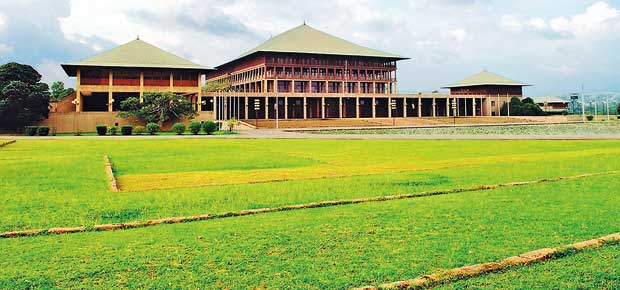Reply To:
Name - Reply Comment
Last Updated : 2024-04-27 00:40:00

In other words, there is a real danger of the State falling into the hands of oppressive and undemocratic groups. As a consequence, the opportunities for promoting social and economic development and public welfare appear to be disappearing fast. On the one hand, the country’s economy is under severe pressure due to increasing debts, continuing exodus of labour, in particular skilled labour, widening trade gap and inadequate foreign direct investment.
"Today, it is not difficult even for unsuspecting members of the general public to be pessimistic about the good governance credentials of the regime"
It is quite clear that the county’s economy is not in good shape. While the quality of life of ordinary people is deteriorating, the necessary reforms and improvements in sectors that directly affect the well being of people have lagged behind. Among these sectors, education, social security, agriculture, health and public transport are the most important. The main reason for this situation is the refusal of the government to reorganize the government machinery on a rational basis as pointed out by the Sound National Policies Program in 2015. We submitted detailed proposals in the above regard but  the leaders paid no attention.
the leaders paid no attention.
Another factor that has significantly contributed to the above situation is the continuation of the earlier practice of appointing close relatives, friends and personal acquaintances to key positions in important public institutions including the Foreign Service without any consideration of the widely valued notions of equality of opportunity and merit, making many such institutions dysfunctional. As a result, scarce public resources allocated to such institutions are not properly made use of to give tangible benefits to the wider public.
"It is quite clear that the county’s economy is not in good shape. While the quality of life of ordinary people is deteriorating"
The situation outlined above has become a major source of frustration and anger for people who value good governance, social justice, public welfare and peaceful coexistence. It is urgent to take steps to change the prevailing situation and steer the country in a more positive direction. We need to point this out to the authorities through a collective effort. We sincerely hope that all right thinking citizens, professionals and intellectuals will contribute to such an effort.
It did not take much time after the formation of the present government for its opponents to talk about good governance in a sarcastic manner. Today, it is not difficult even for unsuspecting members of the general public to be pessimistic about the good governance credentials of the regime. Credibility of many key members of the government is in tatters. There are many reasons for this but the most important reason is the much talked about bond scam. It has helped the opposition to down play endemic corruption under the previous regime that was the main reason for its collapse.
The present regime was given a clear mandate by a majority of voters in this country. Those who rallied round the leaders of the regime prior to the elections had certain priorities for the new government. These were:
Yet, the way the government was formed and the structure of the government that came into being pointed to the fact that the new government was going to be a far cry from what was aspired for by its people. The appointment of over fifty Ministers drawn from diverse political backgrounds to the so-called national unity government headed by the newly appointed leader of one of the constituent parties was sure to create disunity within government and undermine any sense of direction. It was like getting ready to play a cricket match by two incoherent teams without an umpire.
The new government was formed at a time when the country needed a Head of State who could stand above deep political and other divisions, not one who would identify himself with one faction of the government. The country also needed a leader who could appear to transcend ethnic and religious divisions, not one who would closely identify with one ethno-religious group.
The head of State many people wanted was one who would firmly stand by the principles of good governance without fear or favour, not one who would compromise them even reluctantly to accommodate all kinds of politicians for the sake of political expediency. On the other hand, it is equally important to recognize the fact one cannot clap with one hand.
"Yet, it is still not too late for the leaders to strive to elevate themselves above sectarian party interests and demonstrate their commitment to broader national goals"
Commitment to good governance should have been bipartisan in that the leaders of all constituent parties in the government should have demonstrated it in no uncertain terms. But this has not been the case as is clearly evident from the actual behaviour of political leaders throughout. The bond scam and the appointment of all kinds of people to important institutions are clear cases in point. In other words, against a backdrop of decades of deterioration in standards of governance, the country badly needed leaders who would occupy moral high ground and represent the larger interest of the masses and the country. Yet, after nearly three years into the new government, where we stand today is common knowledge and needs no elaboration.
So, what we have observed in the country has been largely politics as usual. While the average politician by and large has behaved in the way that he or she got used to for decades, the present, however, would have been different from the past at least with the presence of a Head of State who would remind all politicians that they had to strive to maintain higher standards of governance, irrespective of their party affiliation, and when they fail to do so, take action either to rein them in or to expel them from the government. But, this has not been possible because there has been almost no difference between the Head of State and Head of Government. The result is that the Head of State has not been able to insist on high standards of governance for party loyalists. The same has been true for the leader of the other main constituent party.
In view of what has been outlined above, it is clear that the overall situation in the country is precarious. There is so much at stake for the people and the country. The need of the hour is to pursue economic and social development through integrated planning guided by evidence based policies and prudent public investment with equal attention being paid to promoting reconciliation and national unity, but increasing political instability today threatens to derail almost everything. Yet, it is still not too late for the leaders to strive to elevate themselves above sectarian party interests and demonstrate their commitment to broader national goals mentioned above. This is the only way to arrest the current negative trends in the country and restore public confidence and trust in the government. Otherwise, they will pave the way for a more disastrous situation than what they inherited from the previous regime.

Add comment
Comments will be edited (grammar, spelling and slang) and authorized at the discretion of Daily Mirror online. The website also has the right not to publish selected comments.
Reply To:
Name - Reply Comment
US authorities are currently reviewing the manifest of every cargo aboard MV
On March 26, a couple arriving from Thailand was arrested with 88 live animal
According to villagers from Naula-Moragolla out of 105 families 80 can afford
Is the situation in Sri Lanka so grim that locals harbour hope that they coul